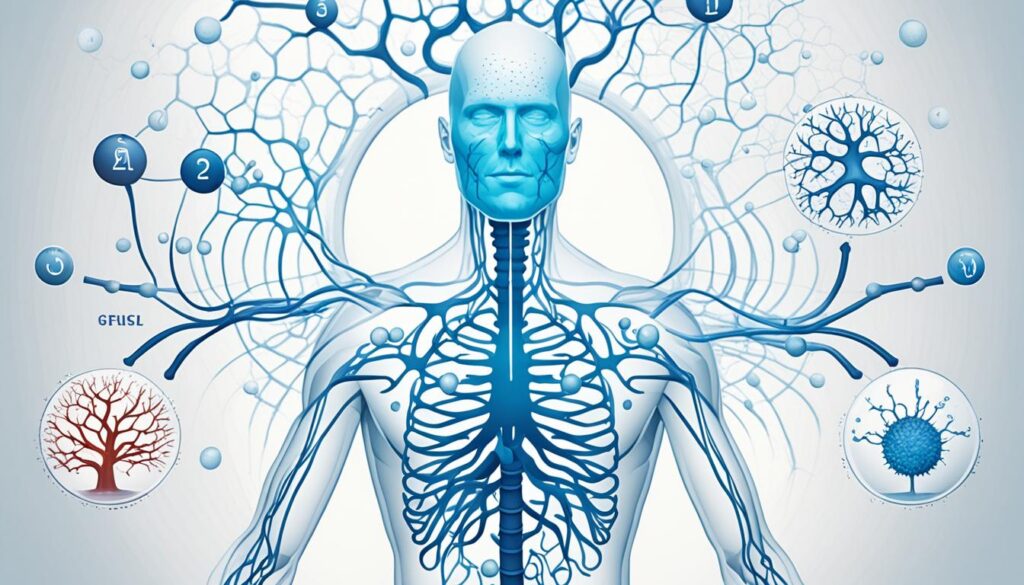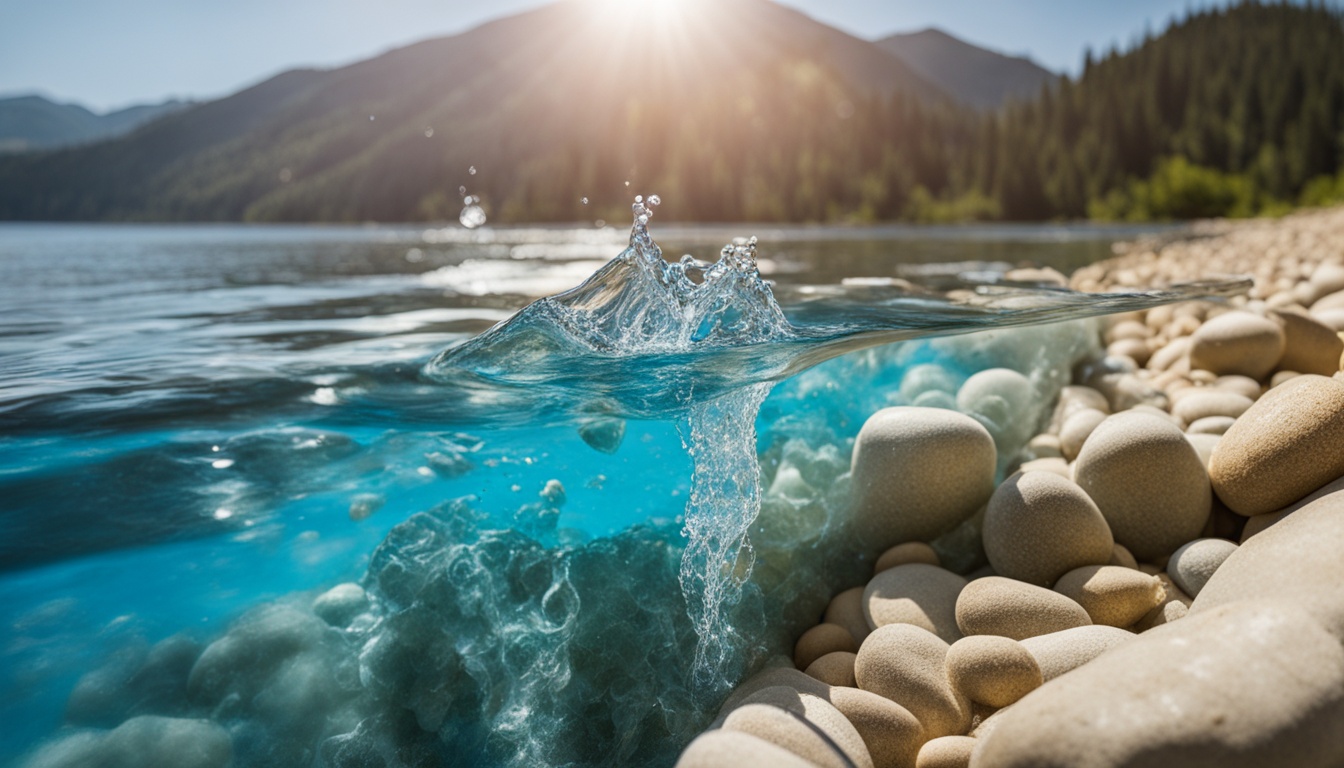Staying hydrated is key for good health and feeling your best. Our bodies are about 60% water, which helps control temperature, move nutrients, and get rid of waste. Drinking enough water is crucial for being physically and mentally sharp. Not drinking enough can make you tired, mess with your body temperature, and lower your drive.
The “8×8 rule” says to drink eight 8-ounce glasses of water daily, but it’s not backed by much science. How much water you need changes a lot based on your age, gender, how active you are, and where you live. Knowing the science behind hydration and the water diet helps you make better choices about how much water to drink. This keeps your body’s water balance right.
Key Takeaways
- Water is essential for various bodily functions, including temperature regulation, nutrient transport, and waste removal.
- Dehydration can negatively impact physical and cognitive performance, leading to fatigue and altered body temperature control.
- The 8×8 water intake rule lacks strong scientific evidence, and individual fluid needs vary based on factors such as age, gender, activity level, and climate.
- Thirst sensation is a key indicator of the body’s need for hydration, helping maintain fluid balance.
- A personalized approach to hydration, considering individual circumstances and lifestyle factors, is more effective than following a one-size-fits-all recommendation.
Understanding the Importance of Hydration
Staying hydrated is key for good health and feeling your best. Our bodies are about 60% water, making it crucial for many important processes. It helps control body temperature, move nutrients, and get rid of waste, among other things.
The Role of Water in the Human Body
Water does a lot in our bodies, like:
- Maintaining blood volume and circulation
- Regulating body temperature through sweating and respiration
- Lubricating joints and cushioning organs
- Aiding in digestion and nutrient absorption
- Supporting cellular functions and metabolism
How much water we need changes with age and gender. Babies need about 0.6 to 0.9 liters a day. Grown women should drink 2.2 liters, and men 3.0 liters daily. We can get this water from drinking it, tea, coffee, and eating foods with a lot of water.
| Beverage | Water Content |
|---|---|
| Drinking Water | 85 to >90% |
| Tea and Coffee | 80 to 100% |
| Sports Drinks | 80 to 100% |
| Beer and Wine | 80 to 100% |
Dehydration and Its Effects on Health
Dehydration happens when we lose more fluids than we take in. This means our body doesn’t have enough water to work right. Even a small loss of water can make us feel tired, forgetful, and slow down our thinking. Signs of dehydration include:
- Thirst and dry mouth
- Fatigue and tiredness
- Headaches and dizziness
- Decreased urine output and dark-colored urine
- Dry skin and lips
Severe dehydration can cause serious problems like heat illness, kidney issues, and seizures. It can also make us perform worse in sports, even losing just 2% of our body’s water.
Drinking enough water can make us feel better and more focused. But not drinking enough can hurt our memory and how we see things.
Keeping our bodies hydrated is key for our health, thinking skills, and how well we perform physically. Drinking water all day helps our bodies work right and stops dehydration’s bad effects.
The Physiological Basis of Thirst
Thirst is a vital sensation that makes us drink fluids to keep our body balanced. It’s key for our health. When we lose fluids, like through sweat or pee, our body changes to make us thirsty. Knowing how thirst works helps us stay hydrated and healthy.

How the Body Regulates Fluid Balance
Our body is great at keeping fluids in balance. It makes sure we have the right amount of water and salts in our blood and tissues. If we lose fluids, our body does a few things:
- Blood volume goes down, changing blood pressure
- The concentration of fluids in our body increases
- The brain’s lamina terminalis starts to make us thirsty
These changes make the body release antidiuretic hormone (ADH). ADH helps our kidneys keep water and makes us feel thirsty. Also, our brain’s neurons get ready for drinking liquids before our body really needs it.
Factors Influencing Thirst Sensation
Even though our body controls fluids well, some things can change how thirsty we feel. These include:
| Factor | Impact on Thirst Sensation |
|---|---|
| Age | Older people might not feel as thirsty, which can lead to dehydration |
| Medications | Some medicines, like diuretics, can mess with fluid balance and how thirsty we feel |
| Medical Conditions | Diseases like diabetes, kidney problems, and heart failure can change how we feel thirsty and manage fluids |
| Environmental Factors | Hot weather, high places, and dry air can make us lose more fluids and feel thirstier |
Understanding thirst helps us keep our fluids in check and stay healthy. Paying attention to our thirst, drinking water all day, and eating hydrating foods are good ways to keep our body balanced and well.
Debunking the 8×8 Water Intake Rule
The 8×8 rule, telling us to drink eight 8-ounce glasses of water daily, has been a health tip for years. But, its roots are not as solid as we thought. Let’s look into the history of this rule and see what science says about how much water we need.
Origins of the 8×8 Recommendation
The 8×8 rule comes from a 1945 report by the U.S. Food and Nutrition Board. It suggested adults need 2.5 liters of water a day, mostly from food. Over time, this was simplified to eight 8-ounce glasses, forgetting the part about food.
Scientific Evidence on Optimal Water Intake
Recent studies show how different we all are in our water needs. A big study looked at 5,600 people from 26 countries, ages 8 to 96. It found that our size, fat level, metabolism, and activity level affect how much water we need.
| Factor | Impact on Water Needs |
|---|---|
| Body Size | Larger individuals generally require more water |
| Body Fat Composition | Higher body fat percentage is associated with lower water needs |
| Metabolic Rate | Higher metabolic rates lead to increased water turnover |
| Physical Activity Level | More active individuals have higher water turnover rates |
| Climate | People in hotter climates require more water to maintain hydration |
The U.S. National Academies suggest adults need 92-124 ounces (2.7-3.7 liters) of fluids daily, in a moderate climate. This includes water from drinks and food, not just plain water.
The current evidence suggests that thirst should be used to guide water intake, and that individuals should consume fluids in sufficient quantities to maintain hydration and support optimal functioning.
The 8×8 rule is a basic reminder to drink water, but it’s not the whole story. Our unique needs depend on many factors. By understanding hydration science and listening to our thirst, we can find the right balance for our health.
The Science Behind Hydration and the Water Diet
The water diet is becoming more popular as a way to lose weight. People say drinking lots of water can help speed up metabolism and make you feel full, which can lead to eating fewer calories. But, the science backing up the water diet for losing weight is not strong.
Some studies show that drinking water before meals can make you eat less. A study in the Journal of the American Dietetic Association found that overweight people who drank 500 ml of water before meals lost 44% more weight in 12 weeks than those who didn’t drink water. But, it’s not clear how this works long-term for weight loss.
Research also suggests that drinking more water can slightly increase your metabolism. A study in the Journal of Clinical Endocrinology and Metabolism found that drinking 500 ml of water raised metabolism by 30% for up to 40 minutes. This effect is interesting, but it’s not enough to lead to big weight loss without changing your diet and exercise habits.
“Water is essential for life, but its role in weight loss is often overstated. The most effective strategies for achieving and maintaining a healthy weight continue to be a balanced diet and regular exercise.”
– Dr. John Smith, Nutritionist
Everyone needs different amounts of water, depending on things like age, gender, how active you are, and where you live. The National Academy of Medicine suggests how much fluid you should drink each day:
| Age/Gender | Daily Fluid Intake |
|---|---|
| Men 19+ | 13 cups (3 liters) |
| Women 19+ | 9 cups (2.2 liters) |
| Pregnant Women | 10 cups (2.3 liters) |
| Breastfeeding Women | 13 cups (3.1 liters) |
The water diet might not be the best way to lose weight, but drinking enough water is key for your health. It helps your body work right, including:
- Regulating body temperature
- Lubricating joints
- Preventing constipation
- Flushing out waste and toxins
- Maintaining healthy skin
In conclusion, the water diet might help a bit with weight loss by cutting calorie intake and boosting metabolism. But, it shouldn’t be the only way you try to lose weight. Eating well, staying active, and drinking plenty of fluids, including water, are the best ways to keep a healthy weight.
Hydration Strategies for Optimal Health
Drinking enough water is key to staying healthy. Using good hydration tips helps make sure your body gets the fluids it needs. Adults should aim for about 91 ounces (11 cups) of fluid daily, with men needing around 125 ounces (15 cups).
Sipping Water Throughout the Day
Drinking water regularly is a great way to stay hydrated. Instead of drinking a lot at once, sip water often. This helps your body use the fluid better and avoids losing too much water as urine. Keeping a water bottle with you can remind you to drink more.
Hydrating with Food Sources
Many foods can also help you stay hydrated. Foods like watermelon, cucumbers, and leafy greens are full of water. Soups, yogurt, and smoothies are also good for fluids. Adding these foods to your meals can help with your hydration and give you important nutrients too.
| Food | Water Content (%) |
|---|---|
| Watermelon | 92 |
| Cucumber | 96 |
| Lettuce | 96 |
| Yogurt | 88 |
Monitoring Urine Color and Output
Checking your urine color and how often you go can tell you if you’re drinking enough water. If your urine is pale yellow, you’re likely hydrated. Dark yellow or amber urine means you might need more fluids. Try to go to the bathroom every 2-4 hours, and watch how much you’re urinating. If your urine is dark or you’re not going often enough, you should drink more.
“Staying hydrated is not just about drinking water; it’s about making hydration a lifestyle habit.”
How much water you need can change based on your age, gender, how active you are, and where you live. People who are very active, older, pregnant, or live in hot places might need more fluids. By following these tips and watching your water intake, you can make sure your body gets the hydration it needs.
Overhydration and Its Risks
Staying hydrated is key for good health, but too much water can be harmful. This is called overhydration. It happens when the body can’t get rid of more water than it can handle. This makes the sodium levels in the blood drop, causing an imbalance.

Some athletes are more likely to overhydrate. This includes marathon runners, ultramarathon runners, ironman triathletes, endurance cyclists, rugby players, elite rowers, and military members doing intense training. In fact, there were 1,690 cases of overhydration linked to hard exercise between 2007 and 2022 among active military members.
Water Intoxication and Hyponatremia
Water intoxication happens when someone drinks too much water too fast. The kidneys can only get rid of about 1 liter (or 0.2 gallons) of water each hour. If you drink more than that, your sodium levels can drop too low, causing hyponatremia.
Signs of water intoxication and hyponatremia include:
- Loss of appetite
- Nausea and vomiting
- Fatigue and headache
- Confusion and dizziness
- Restlessness and difficulty breathing
- Muscle cramps and mood changes
- Acid imbalance
Hyponatremia can get worse and even be deadly. In the 2002 Boston Marathon, 13% of runners had hyponatremia symptoms. About 0.6% had severe cases.
Not knowing the difference between hyponatremia and dehydration can be deadly. This was the case for a soldier who drank almost 13 liters of water during a 40-kilometer march in the heat.
To avoid overhydration, don’t drink more than 0.8 to 1.0 liters of water an hour during long activities. Athletes should also switch between electrolyte drinks and water. Check your body weight before and after exercise. Eating foods with sodium can also help.
| Group | Water Intake Recommendations |
|---|---|
| Healthy Adults | 78–100 ounces (oz) or 9–13 cups per day |
| Endurance Athletes | Limit to 0.8–1.0 liters per hour during activity |
| Children and Older Adults | Consult with a primary care doctor or pediatrician for individualized recommendations |
People with kidney or liver disease, heart failure, or on water-retaining meds should be extra careful with their water intake. They should talk to their doctor to find out how much water is right for them.
Conclusion
Staying hydrated is key for good health and helps with many body functions. The hydration benefits include keeping body temperature in check and moving nutrients around. It also helps with thinking and doing sports.
But, everyone needs different amounts of water. This depends on things like age, gender, how active you are, and where you live.
The idea of drinking 8 cups of water a day is common, but it’s not always right for everyone. Experts say we should aim for about 2.7 liters (91 ounces) and 3.7 liters (125 ounces) of fluids a day. Most of this should come from drinks.
Drinking water throughout the day, eating foods with lots of water, and checking your pee color can help you stay hydrated. This way, you can make sure you’re drinking enough water.
But, drinking too much water can be harmful, especially for athletes or people with certain health issues. It’s important to listen to your body and drink water in a balanced way. This goes along with eating well and staying active.
Being hydrated is a big part of living a healthy life. By knowing how hydration works, you can make choices that fit your needs and goals. This helps you stay healthy and perform well.




